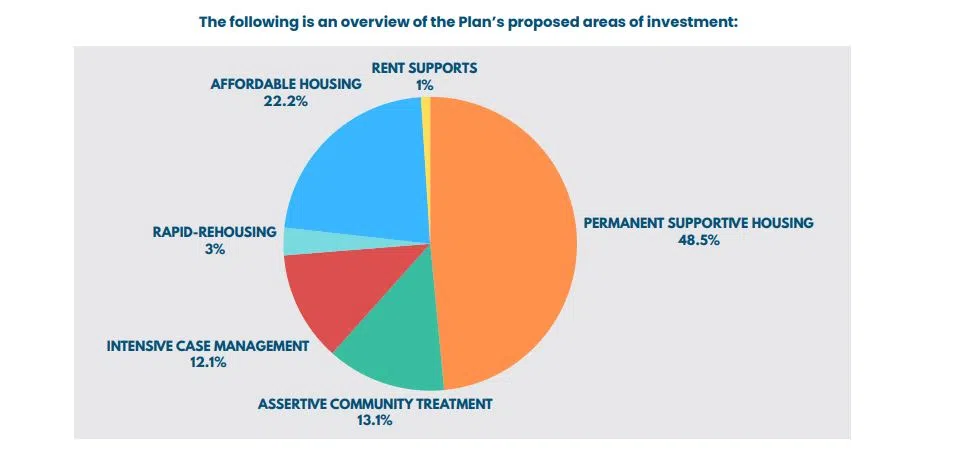As Regina continues to deal with a worsening homelessness problem, the non-profit Namerind Housing Corporation unveiled its five-year plan aiming to end homelessness in the city.
The plan, with a projected cost of $111 million, is built around four key pillars: leadership and implementation, co-ordinated access, housing and supports, and prevention and diversion.
Read More:
- ‘It costs people lives’: City of Regina declares ‘houselessness crisis’
- ‘It’s a crisis’: Regina homeless count sees 824, double 2021 number
- Community grieves at ninth annual Regina Homeless Memorial
Robert Byers, Namerind’s president and CEO, said it would take a commitment from all levels of government to carry out the plan.
“It’s going to take all of us, and it’s important that we get started as soon as we can,” Byers said.

Namerind Housing Corporation says the $111 million plan requires funding from all levels of government to succeed. (Daniel Reech/980 CJME)
He said Namerind has meetings lined up with Mayor Chad Bachynski and with Terry Jenson, Saskatchewan’s minister of social services.
The report said $26 million would need to be allocated for affordable housing, prevention and diversion, along with $58 million for supportive housing and support programs and $27 million for assertive community treatment and intensive case management.
The four pillars encompass strategies like creating unified standards for programs and procedures, having real-time data on homelessness, mapping systems for community services and closing service gaps.
Byers said he hopes the new plan can succeed where the 2019 plan couldn’t.
“I could always say we need more housing. We need different types of housing – affordable, social, shelter space – we need all of that,” Byers said.

Namerind CEO Robert Byers says affordable housing, social housing and shelter space are all needed in the Queen City. (Namerind Housing Corporation)
“With that, you need money. I’m not sure if it’s lacking or if we just weren’t sure, but I think now with real data and up-to-date data that it’s something that really jumps out at you and you know what needs to be done.”
Byers said Namerind has helped take 1,000 people off the streets over the past two years through its co-ordinated access Regina program, and yet homelessness has still increased by more than 250 per cent since 2021, according to Namerind’s 2024 point-in-time count.
Regina city council voted to officially declare a “houselesness crisis” last month, which Byers said was a positive step.
“It’s not just Namerind saying it’s a crisis. It’s the City of Regina, and now they want to meet with the provincial government as well,” he said.
“I think we’re going to pick up that momentum again, and we’re going to work together to solve this.”
Of the 824 people surveyed in the 2024 point-in-time count, Namerind said 75 per cent were Indigenous, 58 per cent were men, 33 per cent were women, 16 per cent were LGBTQ, nine per cent were youths, three per cent were seniors and three per cent were immigrants.
The count found that 28 per cent experienced episodic homelessness, 34 per cent experienced it chronically and 38 per cent experienced transitional homelessness.
Namerind’s report said Regina’s housing market prices have far outpaced inflation. Average rent was $1,400 per month in 2024, and the rent rate increase was 7.9 per cent.
Byers said it’s important to stop the inflow of homelessness, especially by investing in youths.
“It’s really about family supports and just connecting people back to their community, back to their family,” he said.
“I believe out there somewhere, there’s a family member that cares about that person that’s homeless, and if we can connect them, then we will.”
Namerind’s report said housing-first programs in Regina result in a projected 50 per cent cost savings in public services.











